“Good leaders are not made, they are born”
Many people believe in this popular saying. I’m not one of them and in this article I will try to prove that this premise is utterly wrong. In my opinion good leadership is a product of well-developed skills certain managers have. Some of these skills can be learned in school, while others you can gain with life or work experience. Anyway, good business leadership doesn’t have anything to do with biological predispositions. Great leaders know that, in the same way as they know that their superb leadership skills are the result of hard work they put into mastering them. These are some of the most essential skills and traits, every great leader should have:

Project Management
Great leaders aren’t project managers by default, but they should definitely master project management skills and use them to reconcile the work of their subordinates. They should know how to set deadlines and tasks in a way that enables their employees to work harder, better and under less pressure and work-related stress.
Good Communication Skills
Most managers think they are great leaders just because they are able to plan all team operations in advance, but actually this is the easiest part of their work. The most difficult part is to explain planned tasks and assignments to their subordinates. Managers need to know how to express complex ideas in simple words and to use different motivational techniques to increase productivity of their team and of each one of its members.
Communication skills also involve listening. Leaders should be able to understand employee’s wants and needs and to put themselves in their position. Their doors should be open all the time, and they should support employees to share their ideas on how to increase productiveness and cut costs.
Delegation
Leaders need to be trustful when it comes to their team. That’s why their teams need to be properly chosen and trained. Great leader doesn’t do everything by him/herself. He/She assigns people from their team to particular tasks. When doing this leader should know which employees can be trusted with which assignments. Identifying strengths of each team member and capitalizing on them, is a key to delegation. This way everybody will do what they are good at, which also means that they will do their job with much less pressure and come home satisfied. While this coordinated mechanism is ticking, leaders have more time to focus on higher level tasks that directly affect team’s productivity.
Know Your Team
Other than delegation, leaders also need to get up close and personal with every team member and learn all of their strengths, weaknesses and attitudes on different work-related matters. There are managers who don’t know names of their team members, how can somebody even expect from them to know whom to entrust crucial tasks.
Managers should constantly observe employees behavior and if something goes wrong they need to talk to them and offer their help and advice right away. If they realize the problem is too complicated for them to deal with, they should send employees to professionals who will then provide them with psychological assessment and counseling.
Creativity
Most decisions that managers need to make, are not clean-cuts. Books and manuals won’t always give them the answers on work problems and in many cases they need to improvise and set far from the course. Great leaders are creative and they always think outside the box. When everything is going down, they always chose less harmful option and have bigger picture in their mind. Employees often ask their managers for advice. Those who always give them textbook advice and instructions get their authority questioned sooner or later.
These are just some of the most important traits and skills managers need to have to be seen as leaders by their subordinates. They will learn most of these skills while working on both low-level and managerial positions. That’s why great leaders are not the ones who were born into this status, but those who are pulling their own weight up to the top.










